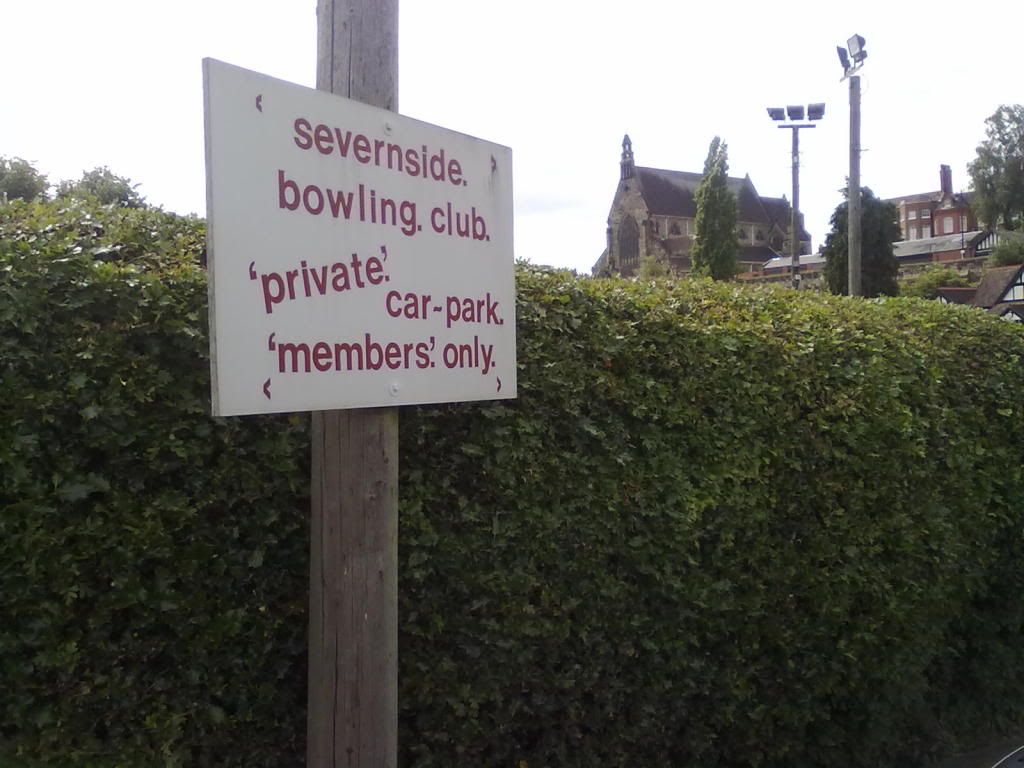Jeremy Paxman: "A truly comparable word for 'privacy' simply does not exist in French or Italian, yet in England it is one of the country's informing principles."
1. Guess what: French is not lacking a word for 'privacy'; in fact there are two: l'intimité and le privé.
2. Even if there wasn't a close match in French for our word 'privacy', that wouldn't mean that the concept of privacy was lacking. Italians sometimes prefer to use the English word, speaking, for example, of "la mia privacy", but that says more about how they see us than about their own habits.
Saturday, 25 December 2010
Friday, 27 August 2010
Saturday, 14 August 2010
that which annoys me
Carol Ann Wilson is 30% right: where there's a comma, only "which" is possible. However, where there's no comma, both "that" and "which" are correct: "The report which I sent last week will be of some help." is a fine sentence. Ignore any guide which tells you otherwise.
mightened of
According to Google, there are 33 examples of "mightened of" in evidence on the Web. (I wonder how many there'll be this time next year?) Although it's pretty stupid-looking, it's forgiveable. After all, how many times have you seen the correct "mightn't've" written down? (Well, only 53 times on the Web, according to Google...) And it looks pretty stupid, too..
Blogpost at Language Log
(Update: It's now 31/8/11 and the current hit total is 114!)
Blogpost at Language Log
(Update: It's now 31/8/11 and the current hit total is 114!)
Monday, 9 August 2010
Little Birmingham
There's widespread coverage in the news of the murder in Pakistan of a couple from Birmingham, Gul and Begum Wazir. The BBC version states that the couple were killed in Salehana, "sometimes referred to as Little Birmingham because of its strong ties with the Pakistani community in the West Midlands." Well, that's interesting, I thought, and I proceeded to do a Google search. And guess what? A search on Salehana brings up no results except for 150 versions of this news story, plus a few people's surnames. Wherever this story originated, that journalist was given a spelling but didn't check it. Now, spellings of Pakistani placenames are variable, to be sure, but it's far from helpful to use a spelling that no-one can find on the internet.
So, how did I find the village? Luckily other news sites gave the name of the district* (Nowshera) and I was able to find this site which handily lists all the villages there. Scrolling down the list I found Saleh Khana. Bingo! The Wikipedia entry for the village is wonderful, and I've done a screencap in case they rewrite it now in a more mature manner...
So, how did I find the village? Luckily other news sites gave the name of the district* (Nowshera) and I was able to find this site which handily lists all the villages there. Scrolling down the list I found Saleh Khana. Bingo! The Wikipedia entry for the village is wonderful, and I've done a screencap in case they rewrite it now in a more mature manner...
Sunday, 8 August 2010
For Area 51, read Proposition 65
Over at alt.usage.english, Laura posted:
While browsing the online Levenger catalogue, I noticed a footnote to a page advertising a Moleskine notebook which reads: "Prop 65 Warning for California Residents— Click here for details." Clicking took me to a pop-up window which reads:
"WARNING! This product contains a chemical known to the state ofCalifornia to cause cancer, birth defects or other reproductive harm."
Further investiagtion reveals that all the Moleskine products offered are so annotated. I am puzzled by this, and as the owner of several Moleskine notebooks, slightly alarmed. What could the chemical be? And how dangerous could it be in a notebook? I suppose there may be a chance of small children or dogs chewing it but that seems somewhat remote.
John Dean referred Laura to the Wikipedia page for (the notorious) Proposition 65. The irony of the zealous implementation of this law being that, rather than reducing litigation, it's had the effect of creating its own little legal industry.
While browsing the online Levenger catalogue, I noticed a footnote to a page advertising a Moleskine notebook which reads: "Prop 65 Warning for California Residents— Click here for details." Clicking took me to a pop-up window which reads:
"WARNING! This product contains a chemical known to the state ofCalifornia to cause cancer, birth defects or other reproductive harm."
Further investiagtion reveals that all the Moleskine products offered are so annotated. I am puzzled by this, and as the owner of several Moleskine notebooks, slightly alarmed. What could the chemical be? And how dangerous could it be in a notebook? I suppose there may be a chance of small children or dogs chewing it but that seems somewhat remote.
Thursday, 29 July 2010
must of
Found an old (1989) paper about "must of". Interestingly, the author says he had trouble finding examples in print, but those were pre-internet days! (Here it is in Steinbeck, and here's a virtual tome called "Must of Got Lost".)
Coates suggests that since "of" is a preposition, speakers who use it in this construction have to somehow make sense of a preposition being in this position, but I doubt it. Language is full of idiom: phrases which don't make much sense if broken down into their component parts, and it could be argued not only that "must of" is simply accepted by its users as having that function, but also that "must have" is itself by way of being an idiom.
Coates suggests that since "of" is a preposition, speakers who use it in this construction have to somehow make sense of a preposition being in this position, but I doubt it. Language is full of idiom: phrases which don't make much sense if broken down into their component parts, and it could be argued not only that "must of" is simply accepted by its users as having that function, but also that "must have" is itself by way of being an idiom.
Monday, 26 July 2010
Thursday, 22 July 2010
How old?
Recent discussion about the expressions "one-year anniversary" and "one-month anniversary" (neither of which is particularly exceptionable despite their registering on many newspaper readers' peevemeters) reminded me of a much weirder case: the expressions "one month year-old" and "one year year-old". These were first brought to my attention by Philip Eden in 2007, in a thread on alt.usage.english. Although the examples to be found on the BBC News website have changed, this usage is still going strong.
Here's some of what I wrote at the time:
"Week year-old", "day year-old", "hour year-old" and even "year year-old" are all out there, in all combinations of singular and plural:
Google unique hits, May 2007, UK hits in brackets
year year-old 742 (78)
month year-old 725 (149)
week year-old 167 (20)
day year-old 80 (6)
hour year-old 5 (0)
Here are some early(ish) Usenet examples. The first YYO is 2 June 1988, quoting from the Washington Post:
"Donald Gene Burleson, a 39-year-year-old Fort Worth programmer, has pleaded innocent to charges of computer sabotage and burglary..."
The first non-media example is by "JJ" on 23 February 1993: "I would envision a much more deeper feeling of loss for my 10 year year old."
The first MYO is by Hitoshi Doi on 11 June 1990: "My 8 month year old son reprogrammed ... the VCR!"
It appears that some people think that "-year(s)-old" is a set term to which the age must be added.
The current Google hit tallies for the expressions are: YYO 772, MYO 626, WYO 405, DYO 199, HYO 34. These totals don't include variants like "months year-old". There are also 513 hits for "century year-old".
Go figure.
Here's some of what I wrote at the time:
"Week year-old", "day year-old", "hour year-old" and even "year year-old" are all out there, in all combinations of singular and plural:
Google unique hits, May 2007, UK hits in brackets
year year-old 742 (78)
month year-old 725 (149)
week year-old 167 (20)
day year-old 80 (6)
hour year-old 5 (0)
Here are some early(ish) Usenet examples. The first YYO is 2 June 1988, quoting from the Washington Post:
"Donald Gene Burleson, a 39-year-year-old Fort Worth programmer, has pleaded innocent to charges of computer sabotage and burglary..."
The first non-media example is by "JJ" on 23 February 1993: "I would envision a much more deeper feeling of loss for my 10 year year old."
The first MYO is by Hitoshi Doi on 11 June 1990: "My 8 month year old son reprogrammed ... the VCR!"
It appears that some people think that "-year(s)-old" is a set term to which the age must be added.
The current Google hit tallies for the expressions are: YYO 772, MYO 626, WYO 405, DYO 199, HYO 34. These totals don't include variants like "months year-old". There are also 513 hits for "century year-old".
Go figure.
Tuesday, 13 July 2010
Home found for lost apostrophe
Wednesday, 7 July 2010
Have we stopped teaching people to write properly?
Iain Dale asks "Why is it that so many people in their twenties have v little understanding of English grammar or basic sentence construction? Aaaaaaagh."
He blames the education they received at school and wonders what the new government will do about it.
He blames the education they received at school and wonders what the new government will do about it.
Sunday, 4 July 2010
A local newspaper reader is angry...
What is it with local-newspaper journalists? Are the courses that churn them out really so bad? Or should we blame their editors? I'm sure they must know how irritating their style is, but they won't give up. You know what I mean; take our local paper the Great Barr Observer: it can never get straight to the point. It's never "Khalid Mahmood did X", it's always "A local MP did X". It's never "Great Barr School pupils have done Y", it's always "Pupils at a local school have done Y." It's at its most farcical when there is only one possibility. So Asda becomes "a local superstore" even though Asda is the only local superstore.
Are there any local papers that eschew this indefinitism? If there are, their readers are truly blessed.
Are there any local papers that eschew this indefinitism? If there are, their readers are truly blessed.
Wednesday, 30 June 2010
Sunday, 30 May 2010
Brain affects
The BBC headline is "Research to find effects on brain of bilingualism" but the link from the front page says "Bilingual brain affects research"...
Saturday, 17 April 2010
Idiot Australian
Putting "people" instead of "pepper"... This BBC article throws up a poor proofreader and an unsympathetic publisher.
Thursday, 15 April 2010
Sunday, 14 February 2010
Shh!
Friday, 5 February 2010
The blog of unnecessary-hyphens
It's clear that few people know how to use hyphens, but I'd like to think that BBC staff had some idea. Alas, this morning their news site includes the headline:
British Airways' £50m loss smaller-than-expected
I'll add a couple more examples later. The title of this post comes from the "blog" of unnecessary quotation marks.
British Airways' £50m loss smaller-than-expected
I'll add a couple more examples later. The title of this post comes from the "blog" of unnecessary quotation marks.
Subscribe to:
Posts (Atom)






